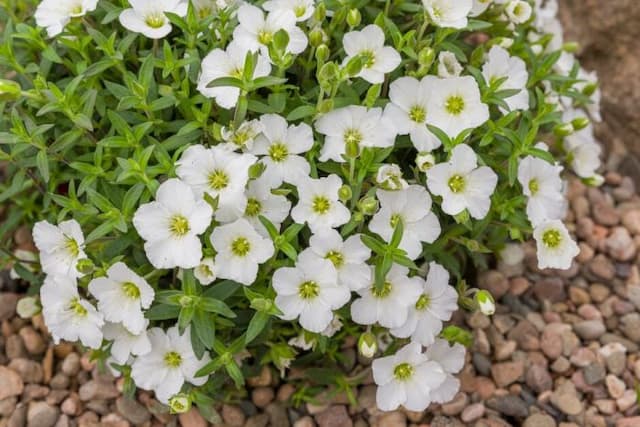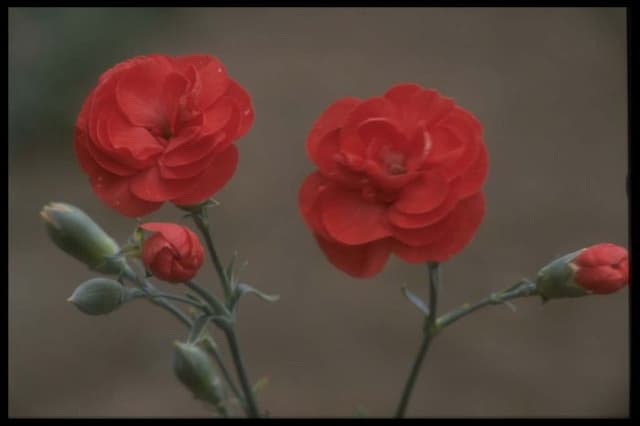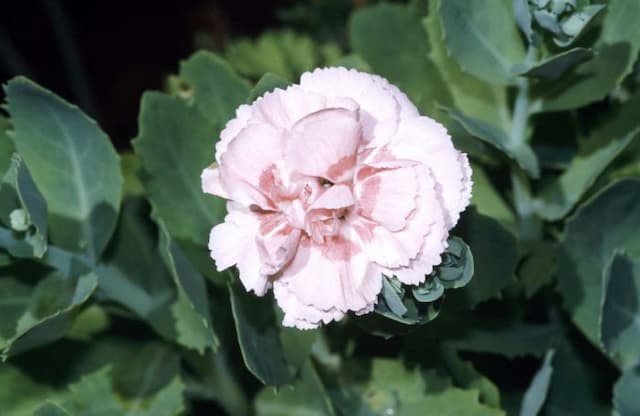Carnation Dianthus 'Fusilier' (p)

ABOUT
Dianthus 'Fusilier' is a charming plant known for its stunning and vibrant flowers. It showcases eye-catching blooms that are rich in color, often in shades of deep red or pink, which stand out beautifully against the foliage. The flowers are composed of frilled petals that give them a ruffled look, exuding a sense of delicate charm and elegance. The petals may exhibit a faintly serrated edge, contributing to their ornate appearance, and in some cases, they may have a subtle, sweet fragrance that can be noticed when standing nearby or when there is a gentle breeze. These floral characteristics make it a popular choice for garden enthusiasts. The foliage of Dianthus 'Fusilier' consists of slender, blue-green leaves that are narrow and grass-like, forming a neat, low-growing mound beneath the flowers. The contrast between the rich floral hues and the cool tones of the leaves adds to the visual appeal of this cultivar. When in bloom, the flowers appear atop slender, sturdy stems that rise elegantly above the foliage, creating a delightful spray of color that can be used to enhance borders, rock gardens, or as part of a mixed perennial display. Overall, Dianthus 'Fusilier' is prized for its showy, long-lasting flowers and its ability to add a splash of color to any garden setting without requiring much space. It is also often cultivated for use in cut flower arrangements due to its attractive flowering stems.
About this plant
 Names
NamesSynonyms
Sweet William, Pinks
Common names
Dianthus 'Fusilier'
 Toxicity
ToxicityTo humans
Dianthus, commonly known as Carnation, is not considered highly toxic to humans. However, ingestion of any part of the plant may cause mild gastrointestinal symptoms in some individuals, including stomach upset, nausea, vomiting, or diarrhea. Contact with the skin might occasionally result in dermatitis. It is generally advisable to refrain from ingesting ornamental plants and to practice good hand hygiene after handling them to avoid potential irritation or mild toxicity.
To pets
Dianthus, or Carnation, is generally considered to be low in toxicity to pets, such as dogs and cats. It is not commonly listed as a toxic plant to pets, and ingestion typically does not lead to serious poisoning. However, as with many plants, ingesting large amounts may cause mild gastrointestinal upset in some animals, which could include symptoms like vomiting or diarrhea. If you suspect your pet has ingested a significant amount of the plant and is showing adverse symptoms, it is best to consult a veterinarian.
 Characteristics
CharacteristicsLife cycle
Perennials
Foliage type
Evergreen
Color of leaves
Blue-green
Flower color
Red
Height
1 foot (30 cm)
Spread
1 foot (30 cm)
Plant type
Herb
Hardiness zones
3
Native area
Europe
Benefits
 General Benefits
General Benefits- Aesthetic Appeal: Dianthus 'Fusilier' adds vibrant color to gardens with its bright pink, red, or purple flowers that bloom in late spring to early summer.
- Fragrance: The flowers emit a spicy, clove-like scent which can be a delightful addition to any garden or patio area.
- Attracts Wildlife: The blooms attract pollinators like bees, butterflies, and birds, enhancing the biodiversity of the garden space.
- Drought Resistance: Once established, Dianthus 'Fusilier' is quite drought-tolerant, making it suitable for xeriscaping or regions with low rainfall.
- Edging and Borders: With its compact, mounded growth habit, it is ideal for creating clear borders or edgings in garden beds and pathways.
- Low Maintenance: This plant is known for being easy to care for, requiring minimal upkeep once it has been properly established in the right conditions.
- Rock Gardens: The plant’s ability to thrive in rocky, well-drained soils makes it a perfect choice for rock gardens or other gravelly garden areas.
- Seasonal Interest: Its foliage often remains attractive throughout the growing season, contributing to the garden's interest beyond just flowering times.
- Container Gardening: Due to its size and growth habit, Dianthus 'Fusilier' is well-suited for container gardening, offering flexibility in placement and design.
 Medical Properties
Medical PropertiesThis plant is not used for medical purposes.
 Air-purifying Qualities
Air-purifying QualitiesThis plant is not specifically known for air purifying qualities.
 Other Uses
Other Uses- Dried Petal Crafts: The vibrant petals of Dianthus 'Fusilier' can be dried and used in crafting projects such as making bookmarks, greeting cards, or pressed flower art.
- Homemade Potpourri: Dianthus 'Fusilier' petals add color and a subtle fragrance to homemade potpourri mixes that freshen up living spaces naturally.
- Cake Decorating: Edible flowers such as Dianthus 'Fusilier' can be candied or used fresh as decorative, non-toxic embellishments on cakes and desserts.
- Floral Bath Salts: The petals can be mixed with Epsom salts and essential oils to create aromatic floral bath salts for a luxurious spa experience at home.
- Herbal Sachets: Dried Dianthus 'Fusilier' flowers can be used in herbal sachets to impart a pleasant aroma in drawers and wardrobes.
- Natural Fabric Dyes: The flowers of Dianthus 'Fusilier' can be used to make natural dyes for coloring fabrics and yarns in shades of pink or red.
- Plant Dye for Paper: Similar to fabric, the petals can be used to create natural dyes for paper, resulting in beautifully tinted handmade papers.
- Perfumery: Though not as common, the scent of Dianthus 'Fusilier' can be infused into oils and alcohols to produce homemade perfumes or colognes.
- Garden Confetti: Fresh or dried petals of Dianthus 'Fusilier' can be tossed as biodegradable, eco-friendly confetti at celebrations such as weddings or garden parties.
- Culinary Garnish: The flowers can be used as a vibrant, edible garnish on salads, soups, and other dishes, adding a pop of color and mild spice.
Interesting Facts
 Feng Shui
Feng ShuiCarnation is not used in Feng Shui practice.
 Zodiac Sign Compitability
Zodiac Sign CompitabilityCarnation is not used in astrology practice.
 Plant Symbolism
Plant Symbolism- Love: The genus Dianthus is often associated with love and affection due to their historical use in traditional love potions and beautiful, delicate flowers.
- Admiration: The bright colors and pleasant scent of the Dianthus 'Fusilier' symbolize deep admiration and can be used to convey respect for someone's talents or qualities.
- Boldness: The 'Fusilier' variety, with its striking and vivid appearance, represents boldness and bravery, reminiscent of the soldiers (fusiliers) after whom it is named.
- Passion: Similar to other members of the Dianthus family, the 'Fusilier' is often considered a symbol of passion and romantic desire, making it a popular choice for romantic occasions.
- Purity: The clear, intense colors of the Dianthus 'Fusilier' are sometimes used to express purity and innocence, especially in a floral arrangement.
- Divine Love: Due to its historical association with the Greek god Zeus (the name Dianthus roughly translates to "flower of the gods"), this plant can also symbolize divine or eternal love.
 Water
WaterCarnations, like the Dianthus 'Fusilier', prefer to be kept in soil that is consistently moist but not waterlogged. Water them deeply to encourage deep root growth, generally providing about one inch of water per week, though this can vary depending on climate conditions. During hot, dry periods, you may need to water the plants more frequently to maintain the moisture level. On average, you could be using about half a gallon for a medium-sized plant, ensuring that the water reaches the root zone without sitting at the surface. It's best to water in the morning to allow foliage to dry out during the day, reducing the risk of fungal diseases.
 Light
LightCarnations like Dianthus 'Fusilier' thrive in full sunlight, needing at least six hours of direct sunlight daily to flourish. The best spot for planting them is in a garden bed or container that has unobstructed exposure to the sun throughout the day. Light conditions that are too dim can result in leggy plants and reduced flowering, so ensure a bright, sunny location for optimal growth and bloom production.
 Temperature
TemperatureCarnations, such as the Dianthus 'Fusilier', perform best in cooler climates, with ideal temperature ranges between 60 to 70 degrees Fahrenheit. They can tolerate temperatures down to about 40 degrees Fahrenheit and can survive brief periods of frost. However, prolonged exposures to temperatures above 80 degrees Fahrenheit might inhibit blooming and can stress the plant. Ensure they are planted in an area where they can enjoy cooler nighttime temperatures to maintain their health.
 Pruning
PruningPruning carnations like the Dianthus 'Fusilier' is essential to promote bushy growth and prolific flowering. Deadhead spent flowers regularly to encourage continued blooming throughout the season. Lightly trim the foliage after the main flowering period to help maintain shape and remove any yellowing or dead leaves. The best time for more significant pruning is early spring or after the plant has finished flowering, ideally not more than one-third of the plant to avoid stressing it.
 Cleaning
CleaningAs needed
 Soil
SoilCarnations, like Dianthus 'Fusilier', thrive in well-draining, loamy soil enriched with organic matter. A mix of two parts potting soil, one part perlite, and one part compost or well-rotted manure is ideal. Maintain a soil pH between 6.0 and 7.5 for optimal growth.
 Repotting
RepottingCarnations, such as Dianthus 'Fusilier', typically require repotting every one to two years. It is best to repot in the spring just before the onset of the growing season for minimal stress to the plant.
 Humidity & Misting
Humidity & MistingCarnations, including Dianthus 'Fusilier', prefer moderate humidity levels. Aim to maintain ambient humidity around 40% to 50%, avoiding extremely high humidity to prevent issues like fungal diseases.
 Suitable locations
Suitable locationsIndoor
Place in bright, indirect light and water when top soil is dry.
Outdoor
Plant in full sun, well-drained soil, water regularly.
Hardiness zone
3-9 USDA
 Life cycle
Life cycleDianthus 'Fusilier', commonly known as Carnation or Pinks, begins its life as a seed, which, when sown, germinates in a period that varies based on conditions, usually within a week to two weeks in ideal situations. After germination, the seedling stage is characterized by the development of a small rosette of leaves. As the plant enters the vegetative stage, it grows stems and more leaves, establishing a robust root system in preparation for flowering. Flowering typically occurs in late spring to early summer, with the plant producing its distinctive fragrant flowers in shades of red, pink, or white. After pollination, which can be assisted by insects or occur through self-fertilization, the flowers produce small seed capsules containing numerous seeds. Ending its annual cycle, the plant may die back, especially in colder climates, or persist as a perennial, with proper care and favorable conditions ensuring its return for several years.
 Propogation
PropogationPropogation time
Spring-Early Summer
Dianthus 'Fusilier', commonly known as Sweet William, is often propagated through seeds, and the best time for sowing them is in late spring to early summer. However, the most popular method of propagation for this cultivar is by cuttings, typically performed in late spring to early summer. To propagate Sweet William by cuttings, a gardener would select a healthy, non-flowering stem and cut a segment approximately 4 inches (about 10 centimeters) long just below a node. The lower leaves are then stripped, and the cutting is dipped in a rooting hormone before being planted in a well-draining soil mix. The cutting should be kept moist and in a warm environment with indirect light until roots develop, which can take a few weeks. Once the cutting has established a good root system, it can be transplanted to its final growing location.



![Pink [Tequila Sunrise]](/_next/image?url=https%3A%2F%2Fplants-admin.emdemapps.com%2Fimages%2Fplants%2F%2Fimages%2F604b5d995d06e.png&w=640&q=75)





